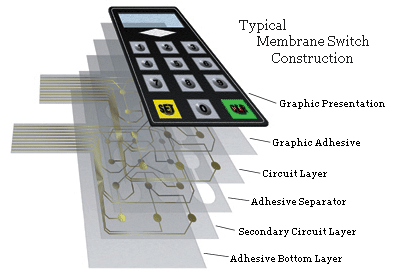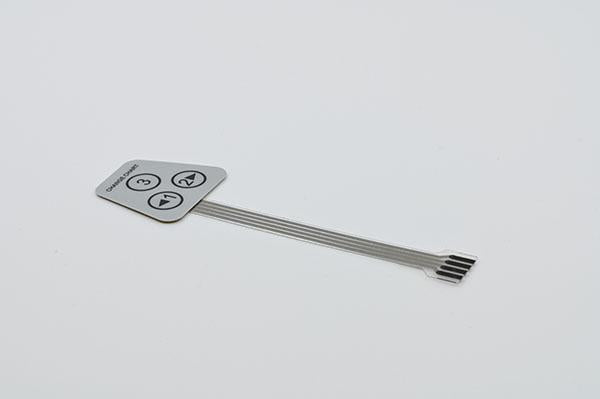If durability matters, sourcing from a trusted membrane switch manufacturer is crucial.
If durability matters, sourcing from a trusted membrane switch manufacturer is crucial.
Blog Article
Everything About Membrane Change: Recognizing Its Layout and Performance
When you consider the control user interfaces in modern gadgets, membrane switches commonly enter your mind. These parts are a lot more than just switches; they blend style and performance flawlessly. Understanding just how they function and what makes them reliable can transform your point of view on daily electronics. But, there are subtleties to their layout and efficiency that you could not understand. Allow's discover what collections membrane layer switches aside from other control systems.
What Are Membrane Layer Buttons?

Their smooth nature makes them very easy to tidy and resistant to dust and wetness, an essential feature in lots of atmospheres. Membrane buttons can also be customized pertaining to shape, size, and graphics, enabling manufacturers to develop distinct interfaces customized to specific items. Plus, they're lightweight and slim, which aids in decreasing the overall mass of tools. Overall, membrane switches play a substantial role in enhancing user experience across a vast variety of applications.
Exactly How Membrane Switches Job
When you push a key on a membrane button, it triggers an uncomplicated yet reliable device. membrane switch manufacturer. The top layer, often made of versatile product, presses down onto a conductive layer underneath it.
You'll see that the tactile responses varies based on the button design, supplying either a soft click or a more pronounced response. Once you release the trick, the membrane returns to its original position, resuming the circuit and stopping the signal. This procedure happens nearly instantaneously, guaranteeing a receptive customer experience.
Membrane buttons are preferred due to their sturdiness and resistance to dirt and wetness, making them excellent for various applications, from family devices to clinical devices. Understanding this procedure helps you appreciate their extensive use.
Key Parts of Membrane Buttons
Comprehending the crucial components of membrane layer switches is fundamental for understanding their functionality and layout. At the core, you'll find the visuals overlay, which provides the aesthetic interface for users. Underneath that, there's a spacer layer that divides the circuit layers, guaranteeing that they do not make contact until pushed. The circuit layer is where the magic occurs; it contains conductive traces that finish the circuit when you press the button. Another crucial component is the adhesive support, enabling the switch to abide by surface areas safely. The safety layer guards against environmental variables and put on, prolonging the button's life-span. Each component plays a considerable duty in making certain reputable performance and user communication. By understanding these components, you'll gain understanding right into exactly how membrane layer switches operate and their value in numerous applications.
Products Used in Membrane Switch Over Design
The efficiency and sturdiness of membrane switches over greatly depend upon the materials utilized in their style. You typically experience polyester and polycarbonate as main substrates as a result of their exceptional toughness and versatility. These materials withstand scratches and chemicals, making them optimal for requiring settings.
The conductive layers frequently use silver or carbon, picked for their integrity and conductivity. membrane switch manufacturer. Silver gives superior efficiency, while carbon is an economical option. For the overlay, you may think about a matte or glossy surface, depending on your aesthetic requirements and user experience
Make certain to pick adhesives that stand up to environmental aspects like temperature and moisture. Picking the ideal products will assure your membrane layer switch stands the test of time.
Layout Factors To Consider for Membrane Layer Buttons
While designing membrane buttons, it's essential to consider various aspects that influence their functionality and user experience. Beginning by concentrating on the layout and switch dimension; make sure they're intuitive and easy to navigate. Think about the tactile comments you want to give-- will individuals require try here a recognizable click or a softer touch? Additionally, consider the products you'll make use of, as they'll affect resilience and aesthetics.
Don't forget the visuals design; clear labeling and shade contrast are substantial for presence. Validate your layout accommodates environmental variables, like dampness or temperature variations, which could affect efficiency. Bear in mind the relevance of testing models with actual customers to collect feedback and make required adjustments. This repetitive process assists you refine the style, confirming it fulfills both practical and aesthetic demands effectively. By very carefully considering these components, you'll create a membrane button that enhances usability and satisfaction.
Applications of Membrane Buttons
Membrane layer buttons are functional components found in various applications, from industrial equipment to customer electronics. You'll see their influence in devices that call for sturdy user interfaces and in gadgets that profit from streamlined styles. Understanding these applications helps you appreciate the functionality and functionality of membrane buttons in day-to-day technology.
Industrial Devices Usage
When you're looking to improve the functionality of commercial equipment, membrane switches offer a trustworthy solution that combines sturdiness with straightforward style. These switches are excellent for severe settings, offering resistance to dust, moisture, and chemicals. Embrace membrane layer switches to enhance your operations and enhance total efficiency.
Customer Electronics Assimilation
In the domain name of customer electronics, membrane buttons play a necessary duty in enhancing individual interaction and gadget capability. You'll find them in devices like microwaves, push-button controls, and gaming consoles, giving a smooth means to interact with modern technology. Their smooth style enables simple assimilation right into various products, making controls user-friendly and straightforward. With their ability to integrate graphics and backlighting, you can enjoy a modern visual that complements the gadget's general look. find more info Membrane layer switches likewise guarantee resilience and resistance to dirt and dampness, extending the life-span of your electronic devices. By picking membrane switches, you improve not simply the performance but also the style of your gadgets, making day-to-day interactions smooth and pleasurable.
Advantages and Drawbacks of Membrane Buttons
While membrane layer switches offer a variety of benefits, they additionally include some downsides that you need to consider. One considerable benefit is their portable style, making them ideal for space-constrained applications. They're also cost-efficient, giving a resilient service with a low production cost. Additionally, their seamless surface area is easy to tidy, improving hygiene in atmospheres like healthcare facilities.

However, there are disadvantages. Membrane switches can have a shorter lifespan compared to mechanical buttons, specifically under heavy use. They can also be much less responsive, which might affect individual responses during operation. If damaged, fixing them can be difficult and typically needs full replacement. Eventually, their sensitivity to severe temperatures and environmental problems might limit their effectiveness in certain settings. Stabilizing these benefits and drawbacks will certainly help you establish if membrane layer switches are the appropriate suitable for your job.
Frequently Asked Questions
How Much Time Do Membrane Switches Over Typically Last?
Membrane changes usually last between 5 to ten years, relying on usage and environmental problems. You'll desire to examine factors like wear, direct exposure to dampness, and temperature level variations to determine their longevity effectively.
Can Membrane Changes Be Customized for Particular Designs?
Yes, you can customize membrane layer buttons to fit certain designs (membrane switch manufacturer). You'll have the freedom to choose shades, forms, and designs that match your task's demands, ensuring they blend perfectly with your general visual
What Is the Cost Variety for Membrane Layer Switch Manufacturing?
The price variety for membrane layer button production commonly falls between $1 and $10 each, depending upon factors like design complexity, quantity, and products. You can get quotes from producers to find the ideal option.

Are Membrane Switches Over Waterproof or Immune?
Membrane switches can be developed to be water-proof or resistant, depending upon materials utilized and building and construction approaches. If you require them for wet atmospheres, guarantee you define those requirements throughout the style procedure.
Just How Do Membrane Layer Switches Over Contrast to Conventional Buttons?
Membrane switches are generally thinner and extra adaptable than standard switches, offering a sleek style. They're frequently easier to clean up and incorporate, yet content may not give the tactile feedback you're utilized to with mechanical alternatives.
Conclusion

Report this page